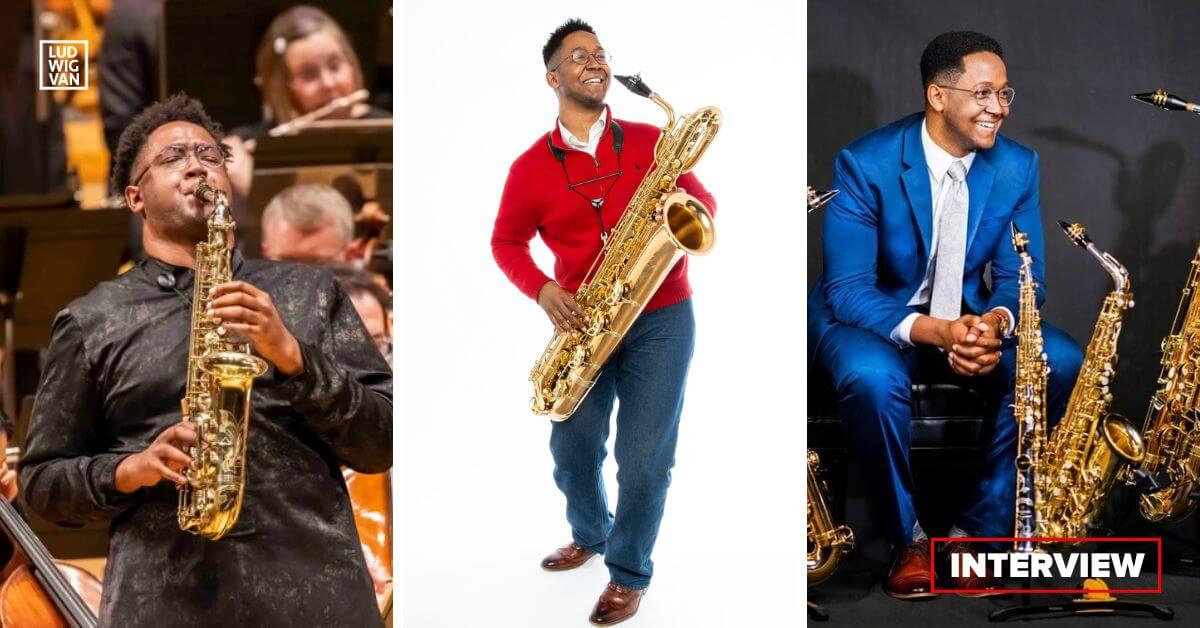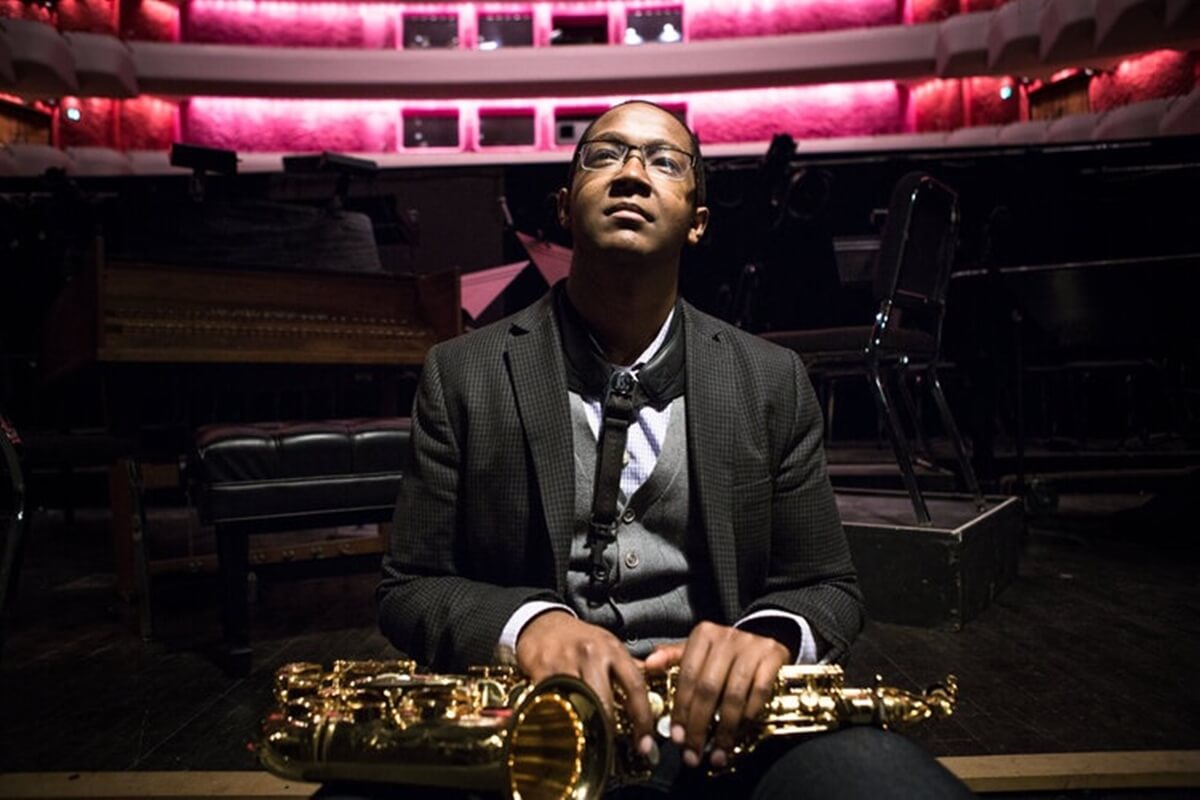
Steven Banks has a goal: to bring the saxophone into the world of classical music — not just on the periphery, but as an integral part of orchestral music. He’ll be making his case in Toronto from January 17 to 21.
His performance represents the Canadian première of John Adams Concerto for Saxophone, along with Banks’ own debut with the Toronto Symphony Orchestra.
Steven Banks, Saxophone
Steven Banks is the recipient of the 2022 Avery Fischer Career Grant, and was one of the first (and still few) saxophonists to be awarded First Prize at the Young Concert Artists Susan Wadsworth International Auditions.
His warm tone has been acclaimed by critics as a revelatory addition to the many orchestras he’s performed with, including The Cleveland Orchestra, Montreal Symphony, Utah Symphony, Colorado Symphony, Mostly Mozart Festival Orchestra and Aspen Festival Orchestra, among others.
Steven first became enthralled with the saxophone and its possibilities after a visiting teacher performed with his high school jazz band during his freshman year.
“It was my first time hearing the saxophone played at that level,” he recalls. He was thrilled, and immediately wanted to know more. The same instructor was teaching at the North Carolina School for the Arts, and a plan was formed.
“I ended up going there after getting off the wait list,” he says. “It was such an intoxicating environment. That’s where I fell in love with classical music.” Despite a background in gospel and soul, he felt classical music’s appeal. “Classical music has always just felt like me.”

Steven Banks, Composer
“I first started writing just for saxophone,” he says, although he notes that his very first piece also included a part for the piano.
“The way I got into it was very organic.” He began writing music in graduate school while wondering how he would bridge that gap between student life and a professional career. “I just wanted to make music about it,” he says. However, encouraged by friends, composition became a bigger and bigger part of his musical practice.
“Now, it’s an incredibly integral part of what I do.”
He says writing new music changes the way he looks at older music. “Thinking like a composer makes me a much better [artist].”
He’s currently working on a piece for saxophone and string quartet. “Eventually I’d love to write a symphony, but it feels very scary.”
Steven Banks, saxophone, Riko Higuma, piano: As I am by Steven Banks
The Saxophone in Classical Music
As Adams points out himself in his notes to his concerto, American audiences automatically link the saxophone to jazz and pop music. It’s seldom found in the classical music repertoire.
Was it a struggle for Banks to bring his love of the saxophone and a similar love of classical music together?
“That’s a funny question. It’s all been difficulties; until recently, it’s been all difficulties.” Even as a college student, he recalls his choice of instrument being constantly questioned. It was not a deterrent, however. “It’s always been clear to me that I wanted to be a soloist.”
Initially, he saw his opportunities as severely limited to teaching, or perhaps playing in a military ensemble. “I never really thought it was possible to perform the way I am now.”
While some works do exist for the saxophone in an orchestral context, he notes that even fewer are regularly programmed by concert presenters. “Repertoire is a big hurdle.” Name recognition and familiarity plays a larger than average role in classical music programming. “Sometimes it doesn’t matter how good the music is. It’s a big hurdle.” Even the instrument’s long time proponents, such as Tim McAllister, aren’t so well known in the classical music world.
Its recognition as an instrument seems long overdue. “It’s the core of my practice as a musician,” he adds. “I think the saxophone has a unique opportunity to be part of this new sound of the 21st century.”
Its connotations allow audiences to hear the music in a different way, and perhaps even to discover classical music itself through a new kind of sound. “I want to bring the saxophone to the centre of the classical music world using the work of these new composers,” he says. “I want it to be seen.”
“The difficulty is getting the instrument to people.” He believes, though, that audiences can be convinced once they hear it in concert. “They don’t know it can sound that way.”
Steven Banks, saxophone and members of the Zorá Quartet (Dechopol Kowintaweewat, violin; Julian Sawhill, viola; Zizai Ning, cello) perform W.A. Mozart: Oboe Quartet in F Major:
Music, Commissions & Inclusion
Along with composing, Banks routinely commissions new works. “The core of my mission as a saxophonist is to be generative.”
Banks is committed to both commissioning and performing new music — not only for its premiere, but as additions to standard repertoire. Nonetheless, he’s fully aware of the challenges. New pieces require more rehearsal time. As he notes, it requires a whole industry to truly commit to the future of the music.
One of those commissions is a new concerto. Billy Childs’ Concerto for Alto Saxophone premiered in February 2023 with the Kansas City Symphony. The work was co-commissioned by nine major American orchestras from Childs, and revolves around the Black American experience.
Banks has performed the piece with several orchestras over 2023. “I absolutely adore that piece. I think it’s a piece that is definitely going to have staying power,” he adds. “I’m very excited for other saxophonists to play it.”
Both as an educator and performer, he’s also committed to inclusion in the classical music world, including the ongoing effort to reintroduce composers such as Florence Price and Joseph de Bologne. He notes that he’s not alone in that endeavour. “There are lot of people committed to bettering the classical music world’s relationship with those composers.”
Slowly but surely, Black musicians are taking up a role in the world of classical music. “I think it’s one of those things that it takes a very long time to do the work that needs to be done. It’s absolutely happening.”
In commissioning work from Black composers, he’s aiming for that level playing field. “[I’m committed] to performing their pieces as if it was Sibelius,” he says, “and doing the music justice.”
Saad Haddad: A Sonata for When Time Stands Still | Steven Banks, saxophone and Xak Bjerken, piano:
John Adams: Saxophone Concerto (2013)
Adams’ 29-minute Saxophone Concerto saw its premiere in Sydney, Australia in 2013. In the composer’s notes to the work, he describes writing the piece directly following his oratorio The Gospel According to the Other Mary.
“One would normally be hard put to draw lines between two such disparate creations. One deals with such matters as crucifixion, raising the dead and the trials of battered women. The other has as its source my life-long exposure to the great jazz saxophonists, from the swing era through the likes of Coltrane, Eric Dolphy and Wayne Shorter.”
Adams’ father played alto sax in a swing band during the 1930s, and he grew up listening to jazz as a constant on the record player. Still, with the Concerto, his goal is not to recreate jazz, but to use it as inspiration in the form of Western classical music.
He describes it best:
“While the concerto is not meant to sound jazzy per se, its jazz influences lie only slightly below the surface.”
“This is an interesting piece, because it walks the line between jazz and classical music,” Steven says. “The sound that he was envisioning is very jazz adjacent.”
Banks actually played the piece for the composer, at first using what he calls “real jazz” inflections, but the sound wasn’t what Adams was after. Like many of Adams’ works, at times the piece is quite modal, reminiscent of classic jazz of the 60s and 70s. “But, there are also a lot of places that mimic a solo section with strings that you might find in [Charlie Parker].”
He calls it a blend of minimalism and Adams’ more recent, and more complex, style.
“I’ve never played anything like this piece,” he says.
“This piece is uniquely challenging for the orchestra,” Banks adds. He notes the complexity of the composition that changes meter “almost every bar”.
“It’s really sort of an athletic event. I’m excited to do that with an orchestra with the calibre of the TSO.”
- More information and tickets about the concerts on January 17 & 20 (at Roy Thomson Hall), and January 21 (at George Weston Recital Hall) – where Oundjian will also conduct Rachmaninoff’s Third – [HERE].
Are you looking to promote an event? Have a news tip? Need to know the best events happening this weekend? Send us a note.
#LUDWIGVAN
Get the daily arts news straight to your inbox.
Sign up for the Ludwig Van Toronto e-Blast! — local classical music and opera news straight to your inbox HERE.
- PREVIEW | SUMMER OPERA LYRIC THEATRE Presents Handel’s Xerxes, Mozart’s Idomeneo & Puccini’a La Boheme July 26 To August 4 - July 26, 2024
- PREVIEW | YENSA Festival V.2 Offers Black Flames Performances & Other Ways To Celebrate Black Women In Dance - July 25, 2024
- PREVIEW | Canadian Talent Conspicuous In The Met: Live In HD 2024-25 Season - July 25, 2024



